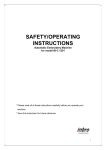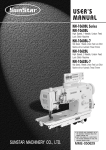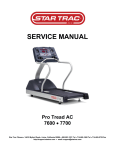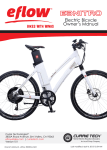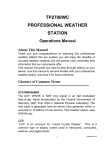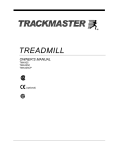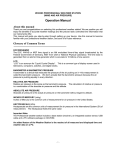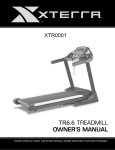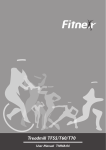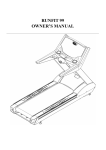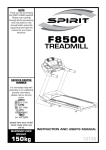Download Jet 7000 - 6000
Transcript
TABLE OF CONTENTS n SECTION o o o o o o o o o o o o 3: WIRING D I A G R A M 4: CONSOLE ENGINEERING MODE GUIDE JET7000 (OLD) ENGINEERING MODE GUIDE.....................................4-1 JET7000 (OLD) TOTAL "TIME" & "DISTANCE" INSTRUCTION..........4-2 JET6000/7000N ENGINEERING MODE GUIDE....................................4-3 JET7000E ENGINEERING MODE GUIDE..............................................4-4 n SECTION o IMPORTANT SAFETY INSTRUCTIONS WIRING DIAGRAM (TERMINAL END, CE)............................................3-1 WIRING DIAGRAM (TERMINAL END)....................................................3-2 WIRING DIAGRAM (MCB)......................................................................3-3 n SECTION o 2: GROUNDING INSTRUCTIONS...................................................................2-1 POWER VOLTAGE INSTRUCTIONS...........................................................2-1 n SECTION o MAINTENANCE PROCEDURE MAINTENANCE CHECK LIST..................................................................1-1 TENSIONING THE BELT PROCEDURE..................................................1-2 DECK RE-WAXING PROCEDURE.............................................................1-3 CLEAN THE GROOVES PROCEDURE....................................................1-4 n SECTION o 1: 5: MCB LED INSTRUCTIONS MCB LED INDICATION.............................................................................5-1 PWM MCB LED CHART..............................................................................5-2 MCB LED TROUBLESHOOTING CHART..............................................5-3 Revision: 1.0 Date: 2001-06-01 TABLE OF CONTENTS n SECTION o o o o o o o o o o o o o o o o o o o o o o o o 7 : PARTS REPLACEMENT RUNNING BELT / DECK / ROLLER......................................................7-1 MOTOR......................................................................................................7-2 INCLINE MOTOR (JET6000).................................................................7-3 CONSOLE CABLE (JET6000)...............................................................7-4 MOTOR BEARINGS & CARBON BRUSH............................................7-5 GEAR MOTOR (JET7000 SERIES).......................................................7-6 CONSOLE CABLE (JET7000 SERIES).................................................7-7 CONSOLE CONTROL BOARD............................................................7-8 KEY-PAD...............................................................................................................7-9 ELEVATION RACK (JET7000/N)............................................................7-10 CHAIN (JET7000/N)...............................................................................7-11 n SECTION o TROUBLESHOOTING NO DISPLAY ON CONSOLE...............................................................6-1 RUNNING SPEED IS NOT STABLE...................................................6-2 TREADMILL STARTS TO RUN BY ITSELF........................................6-3 ALL OR SOME OF KEYS ON CONSOLE DO NOT WORK...............6-4 NOISE GENERATED UNDER MOTOR COVER.................................6-5 TREADMILL WILL NOT START...........................................................6-6 HEART-RATE-CONTROL FUNCTION DOES NOT WORK...............6-7 TREADMILL WILL NOT INCLINE UP OR DOWN............................6-8 TREADMILL WILL INCLINE UP OR DOWN BY ITSELF..................6-9 TREADMILL VARIES THE SPEED BY ITSELF...................................6-10 ERROR MESSAGE ON CONSOLE.......................................................6-11 n SECTION o 6: 8: SERVICE FORM MCB LED STATUS REPORT..................................................................8-1 FIELD FAILURE REPORT......................................................................8-2 PARTS ORDER FORM.............................................................................8-3 WARRANTY CLAIM FORM.....................................................................8-4 Revision: 1.0 Date: 2001-06-01 SECTION 1 MAINTENANCE PROCEDURE Revision: 1.0 Date: 2001-06-01 PREVENTIVE MAINTENANCE SCHEDULE JOHNSON TREADMILL Item Daily Weekly Monthly Quarterly Biannual Annual Console Mounting Bolts Frame Inspect Clean Inspect Clean (Vacuum) Running Belt Top Inspect #3 Carbon Brush Inspect Power Cord Inspect Display Console Clean Handlebar Clean Inspect Inspect Handrail & Handlebar Inspect Front Roller Clean Rear Roller Emergency Button Replace Inspect Inspect Test Tension Wheel Inspect V Belt Clean Inspect Inspect & Re- waxing Deck Re-waxing Running Belt Inspect Control Box Clean (Vacuum) Motor Clean 1-1 Revision: 1.0 Date: 2001-06-01 TENSIONING THE BELT Caution: Running Belt: Over-tightening of the roller will severely shorten the life of the belt and may cause further damage to other components. If when you plant your foot on the belt, you can feel a slipping sensation then the belt has stretched and is slipping across the rollers. This is a normal and common adjustment on a new treadmill. To eliminate this slipping, tension both the rear rollers Allen bolts 1/4 TURN as shown above. Try the treadmill again to check for slipping. Repeat if necessary, but NEVER TURN the roller bolts more than 1/4 turn at a time. Perfe ct Tension o f Running Belt: 0.6~0.9 lbs Drive Belt: If you have tensioned the running belt and are still experiencing a slipping, adjust the tension screw. Then try the treadmill again to check for slipping. Perfe ct Tension of D rive Belt: 1-2 65kgw Revision: 1.0 Date: 2001-06-01 DECK RE-WAXING PROCEDURE Frequency: Procedure: Every 1 month. 1. After removing the running belt, clean the deck and belt by using a clean towel. 2. Place the (new) running belt. 3. Place some wax on the deck about 10 cm from the edge, in such that the wax is evenly distributed across the deck. 4. Tighten the deck screws and assemble the rear roller first, then assemble the front roller. 5. Replace the drive belt on the transmission pulley by turning the Flywheel clockwise by using left hand and use right hand to push the drive belt on to grooves of the front roller pulley. 6. Install the front / rear rollers. Adjust the roller fixed bolts to center the running belt at speed 4mph (6.4kph). 7. Turn on the power and then press the start key, then hold down the fast key until the window indicates 2 mph (3 kph) and then step on the belt for 5 minutes to ensure the wax has been evenly distributed underneath the belt. WAX Name: CHRIS Content: TIAN SUNWAYLUBE 1180 Viscosity Grade 68 Viscosity @40C 68.0 @100C 9 . 1 Viscosity Index 100 Pour Point, C 12 Flash Point, C 216 1-3 Revision: 1.0 Date: 2001-06-01 CLEAN THE GROOVES PROCEDURE Frequency: Procedure: Every 3 months. 1 Remove the drive belt and check the grooves in belt for dirt or dust and clean it. If dirty grooves in the drive belt, motor and roller pulley, there will be noises while running. 2 Check the grooves in motor pulley for dirt or dust and clean it. 3 Check the grooves in roller pulley for dirt or dust and clean it. 1-4 Revision: 1.0 Date: 2001-06-01 SECTION 2 IMPORTANT SAFETY INSTRUCTIONS Revision: 1.0 Date: 2001-06-01 IMPORTANT SAFETY INSTRUCTIONS Note: This product must be grounded When using an electrical product, basic precautions should always be followed, including the following: GROUNDING INSTRUCTIONS WARNING: Connect this appliance to a properly grounded outlet only. See grounding Instructions. This product must be grounded. If it should malfunction or breakdown, grounding provides a path of least resistance for electrical current to reduce the risk of electrical shock. This product is equipped with a cord having an equipment-grounding conductor and a grounding plug. The plug must be plugged into an appropriate outlet that is properly installed and grounded in accordance with local codes and ordinances. DANGER - Improper connection of the equipmentgrounding conductor can result in a risk of electric shock. Check with a qualified electrician of serviceman if you are in doubt as to whether the product is properly grounded. Do not modify the plug provided with the product - if it will fit the outlet, have a proper outlet installed by a qualified electrician. Note: Power voltage 110v model: 95v ~ 140v Power voltage 220v model: POWER VOLTAGE INSTRUCTIONS Power voltage 110v model: 95v ~ 140v 220v model: 210v ~ 250v 210v ~ 250v 2-1 Revision: 1.0 Date: 2001-06-01 SECTION 3 WIRING DIAGRAM INSTRUCTION Revision: 1.0 Date: 2001-06-01 WIRING DIAGRAM (TERMINAL END, CE) Ø I1-----A2 Ø E1-----B1 Ø I2-----A3 Ø E2-----Ground Ø A1-----C1 Ø E3-----D2 Ø A4-----C2 Ø B2-----D4 Ø C3-----AC1 of MCB Ø D1-----I3 Ø C4-----AC2 of MCB Ø D3-----I4 Ø I5-----Ground 3-1 Revision: 1.0 Date: 2001-06-01 WIRING DIAGRAM (TERMINAL END) Ø E1-----B1 Ø E2-----GROUND Ø E3-----D2 Ø D4-----B2 Ø D1-----AC1 of MCB Ø D3-----AC2 of MCB 3-2 Revision: 1.0 Date: 2001-06-01 WIRING DIAGRAM (MCB) Ø A1-----Motor wire (red) Ø A2-----Motor wire (black) Ø P1-----V.R. wire (except the JET7000E) Ø P2-----Sensor wire Ø P3-----8-pin console cable Ø P4-----6-pin console cable Ø UP-----Incline (yellow) (except the JET7000E) Ø Down-----Incline (white) (except the JET7000E) Ø ELEV. COMMMON-----Incline (black) (except the JET7000E) Ø AC1-----CE(C3 of Capacitor) Non CE(D1 of On/Off switch) Ø AC2-----CE(C4 of Capacitor) Not CE(D3 of On/Off switch) 3-3 Revision: 1.0 Date: 2001-06-01 SECTION 4 CONSOLE ENGINEERING MODE GUIDE Revision: 1.0 Date: 2001-06-01 JET-7000 (Old) Console Engineering Mode Guide I. To set up the system parameters: 1 Press Slow, Down, and RESET keys simultaneously to enter Engineering Mode. 2 While the display read "CAL-HI", press PROGRAM INTERVAL. The display will show C1. Please press Fast or Slow keys to set C1, and then press Up key to set C2-C6.(refer to table 1) parameter value memo C1 35 For ver0.3 35(British) 51(metric) C2 125 C3 66 C4 50 C5 4 C6 1-89 Only for ver 0.3 max time Table 1 3 Press POWER key to save. II. To calibrate the elevation . u (from 0 to 15%) 1. Press Slow , Down, and RESET keys simultaneously. And the display reads "CAL-HI". 2. While the treadmill raises to the maximum incline, verify the grade should be 15% (30cm). 3. Press the START/STOP key, and the display reads "CAL-LO". 4. While the treadmill lower to the minimum incline, verify the grade should be 0% (8~9cm). Press the START/STOP key to store. 4-1 Revision: 1.0 Date: 2001-06-01 Console Engineering Mode Guide JET-7000 (Old) u If the distance between the front bottom edge of the frame and the floor does not meet the specifications either at the maximum or minimum incline, you have to adjust the location of the related limit switch to calibrate the incline to Spec. III. To calibrate the speed. IV. (Old Version) To choose metric or British mode. (New Version) To choose metric or British mode. 1. Press Slow, Down, and RESET keys simultaneously. 2. While the display reads "CAL-HI", press Up key. Then the display shows "SLO". 3. Read the real speed from the window of "TIME". (The speed value on the "TIME" window is in British System only) 4. Using the Fast or Slow keys to adjust the speed of the treadmill to 0.5mph (0.8kph). Then press START/STOP key, and the display shows "FAS". 5. Using the Fast or Slow keys to adjust the speed of the treadmill to 12.4mph (20.0kph). 6. Press to START /STOP key to store. (OLD): Hold down SAFETY and POWER keys, then remove SAFETY key then the display shows "Si" or "bri". u If you want the metric mode, you must remove POWER key when the display shows "Si".(the British mode ê "bri") Then the display shows "bye" briefly, and reset itself. (NEW): Hold down SAFETY, PROGRAM INTERVAL and RESET keys, then remove SAFETY key then the display shows "Si" or "bri". u If you want the metric mode, you must remove PROGRAM INTERVAL and RESET keys when the display shows "Si".(the British mode ê "bri") Then the display shows "bye" briefly, and reset itself. (Except the ver 0.3) 4-1 Revision: 1.0 Date: 2001-06-01 Total "TIME" & "DISTANCE" Instruction JET-7000 (Old) When you press Safety key and release (for ver 0.3, press down FAST & UP key) then, the display shows: TIME-WINDOW HEART RATE-WINDOW DISTANCE/CALORIES XXXX XX XXX SPEED/INCLINE XX u The content in the TIME-WINDOW indicates the accumulated running hours of the treadmill. u The content in the HEART RATE & DISTANCE/CALORIES-WINDOW indicate the accumulated running miles (in British system only) of the treadmill. u The content in the SPEED/INCLINE-WINDOW indicates the version of software. e.g. u TOTAL TIME: 51 hours u TOTAL DISTANCE: 2325 miles u SOFTWARE VERSION: 0.1 4-2 Revision: 1.0 Date: 2001-06-01 Console Engineering Mode Guide 1. 2 3 JET-6000/7000NEW Holding “UP” & “SLOW” keys simultaneously about 5 seconds to enter Engineering Mode. The Display will be showed "P6". Press “SELECT” key then press “SLOW” or “FAST” to set metric(kph) or British(mph). Press “SELECT” key to store. Press “DOWN” key to reach the “P0” address. Then press “SELECT” key for setting the “P0” parameter (refer to “DISTANCE’ window”). Press “FAST” OR ‘SLOW’ key to adjust speed When the speed display 0.5mph(0.8kph) on “SPEED” window then press “SELECT’ key to store. Follow the step 3 for setting the “P1”(12mph, 19.2kph) and “P2”(6mph, 9.6kph). Press “UP” key to reach “P5” address, press “SELECT” key. Then press “FAST” key until the deck raise to the max incline. Then press “SELECT’ to store. 6 Press “DOWN” key to reach “P4” address, press the “SELECT” key. Then press “SLOW” key until the deck lowers to min incline. Press “SELECT’ key to store. 7 Press “UP” key to reach “P7” address, press “SELECT” key. Then press “SLOW” or “FAST” key to adjust the values to "99". Press the “SELECT” key to store. 8 Press “UP” key to reach “P8” address, press “SELECT” key. Then press “SLOW” or “FAST” key to input your weight. Press the “SELECT” key to store. 9 Press “UP” key to reach “P9” address, press “SELECT” key. Then you can see the total running hours of the treadmill. 10 Press “UP” key to reach “P10” address, press “SELECT” key. Then you can see the total running distance of the treadmill. 4 5 u Remark: 1 2 Hold down the “UP” and “DOWN” key about 5 seconds to reset under the “P9” or “P10”. Holding the “START” key about 5 seconds to reset the P0 P1 P2 P4 P5 in “P7” of engineering mode. u Define the parameters: P0 … .Min. Speed P1 … .Max. Speed P2 … .Mid. Speed P3 … .None P4 … .Min. Slope P5 … .Max. Slope P6 … .Unite mode P7 … .Max. Time P8 … .User Weight P9 … .Total RunningTime P10...Total Running Distance 4-3 Revision: 1.0 Date: 2001-06-01 Console Engineering Mode Guide JET-7000E 1 2 3 4 5 6 7 8 9 Press “SLOW”, “STOP” keys simultaneously about 5 seconds to enter Engineering Mode. The Display will be showed "P6". Press “SELECT” key then press “SLOW” or “FAST” to set metric(kph) or British(mph). Press “SELECT” key to store. Press “STOP” key for next parameter setting Press “SLOW” key to reach the “P0” address. Then press “SELECT” key for setting the “P0” parameter (refer to “DISTANCE’ window”). Press “FAST” OR ‘SLOW’ key to adjust speed When the speed display 0.5mile(0.8km) on “SPEED” window then press “SELECT’ key to store. Press “STOP” key for next parameter setting Follow the step 3 for setting the “P1”(12mph, 20kph) and “P2”(6mph, 10kph). Press “FAST” key to reach “P7” address, press “SELECT” key. Then press “SLOW” or “FAST” key to adjust the values to "99". Press the “SELECT” key to store. Press “STOP” key for next parameter setting Press “FAST” key to reach “P8” address, press “SELECT” key. Then press “SLOW” or “FAST” key to input your weight. Press the “SELECT” key to store. Press “STOP” key for next parameter setting Press “FAST” key to reach “P9” address, press “SELECT” key. Then you can see the total running hours of the treadmill. Press “STOP” key for next parameter setting Press “FAST” key to reach “P10” address, press “SELECT” key. Then you can see the total running distance of the treadmill. Press “STOP” key for next parameter setting Press the Safety Key to finish. u Remark: 1 2 Holding the “FAST” and “SLOW” key about 5 seconds to reset the accumulated in “P9” or “P10” of engineering mode Holding the “START” key about 5 seconds to reset the P0 P1 P2 in “P7” of engineering mode. u Define the parameters: P0 … .Min. Speed P1 … .Max. Speed P2 … .Mid. Speed P3 … .None P4 … .None P5 … .None P6 … .Unite mode P7 … .Max. Time P8 … .User Weight P9 … .Total RunningTime P10...Total Running Distance 4-4 Revision: 1.0 Date: 2001-06-01 SECTION 5 MCB LED INSTRUCTIONS Revision: 1.0 Date: 2001-06-01 MCB LED Indication When we designed the lower control board (MCB) for our treadmills we placed status lights (LEDs) on it to aid in field diagnosis and repair. The following is an overview of what these indicator lights mean and what can be checked with them in the field. Note: Use a multi-meter to test the power socket. 210v ~ 250v Note: For PCB (Upperboard) 115VAC Light - When lit, this indicates that the MCB has power applied. If this LED is off, check connections, power switch position, fuses and circuit breakers. If the AC light is not lit, the MCB will not operate. +12V Light- when lit, this indicates the presence of the regulated 12-volt direct current supply necessary for the operation of the PCB. If dim the supply voltage may be marginal and if out not present or inadequate. If the light is not lit, the console will not operate. If the AC light is lit and the +12V light is not, check for shorted cabling or a defective upper console. 5-1 Revision: 1.0 Date: 2001-06-01 MCB LED Indication Note: Motor power MOTOR Light- When lit, indicates the Start key has been pressed and the K1 relay has been activated, which will then allow the AC power to be present to the control board with the two big capacitors on it. If the MOTOR light is not lit after the Start key has been pressed, check the keypad, the 8-pin cable and the interconnection of the wiring mentioned above. If the problem persist, return the board to JMI. ILT1/ILT2 Note: Light- When ILT1 is lit, indicates uover 25 +- 3 Amps the current to the motor is under 25 when ILT2 is lit +- 3 Amps. When ILT2 is lit, indicates the current to the motor has uunder 25+- 3 Amps reached the peak current trip point of 25 +- 3 Amps. The MCB when ILT1 is lit might be broken down if the over-current situation persists for a while. It is recommended that the treadmill should be thoroughly If ILT1 is not lit, examined for wear or damaged components, which might have lead check the fuse. to the extended current limit condition. Besides, treadmill might have to be re-waxed at this time. M.C.SIG Note: A control command from the PCB to the MCB Light- Indicates the control PWM from the PCB is present. It will blink at the control frequency used by the PCB when the PCB commands speed. If the control signal should exceed 95 percent duty cycle, the PWM light shuts off and sets the MCB to a safe shutdown mode. In the event this should occur, the power to the treadmill should be removed, the cabling checked for shorts and the PCB replaced. If this problem persists, replace the MCB. 5-1 Revision: 1.0 Date: 2001-06-01 MCB LED Indication Note: The incline is being commanded up Note: The incline is being commanded down Note: RPM signal from the speed sensor-magnet pair. UP Light- Indicates the PCB is commanding the incline gear to move up. If the User is commanding the incline to increase and this light is not lit, check cabling, verify proper PCB operation and replace it if either is defective. If the problem persists, replace the MCB. If the light is lit but the incline is not moving, check and verify incline gear and its connection to the board. If this problem persists replace MCB. DN Light- Indicates the PCB is commanding the incline gear to move down. If the User is commanding the incline to decrease and this light is not lit, check cabling, verify proper PCB operation and replace it if either is defective. If the problem persists, replace the MCB. If the light is lit but the incline is not moving, check and verify incline gear and its connection to the board. If this problem persists replace MCB. SPEED Light- Indicates the MCB is receiving the revolution signal from the speed sensor-magnet pair. If this light is not lit, verify the speed sensor (reed switch) and magnet installed in the front roller. If this problem persists, replace MCB. 5-1 Revision: 1.0 Date: 2001-06-01 PWM MCB LED CHART NO. 115V +12V AC MTR ILT1 ILT2 M.C.SIG UP DOWN 1 OFF OFF OFF OFF OFF OFF OFF OFF 2 ON OFF OFF OFF OFF OFF OFF OFF 3 ON OFF ON OFF OFF OFF OFF OFF 4 ON ON OFF OFF OFF OFF OFF OFF 5 ON ON OFF OFF OFF OFF OR BLINKING N/A N/A 6 ON ON ON OFF ON and OFF BLINKING N/A N/A N/A N/A 7 ON ON ON ON OFF COMES ON BRIEFLY & THEN SHUTS OFF 8 ON ON ON ON OFF N/A ON OFF 9 ON ON ON ON OFF N/A ON OFF 10 ON ON ON ON OFF N/A OFF ON 11 ON ON ON ON OFF N/A OFF ON 5-2 Revision: 1.0 Date: 2001-06-01 MCB LED-AIDED TROUBLESHOOTING CHART NO . PROBLEM/RESULT CORRECTIVE ACTION 1 No operation of MCB or PCB Verify connections, power switch and circuit breaker. 2 No operation of MCB or PCB Replace MCB 3 PCB will not power up Replace MCB Verify adequate line voltage. If line voltage is 4 PCB will power up but the MCB adequate, MCB is damaged and needs to be will not operate returned to manufacturer. 5 Will not operate the motor Verify connections to the P3 and the keypad. If the connections look good, verify the 8-pin cable and the keypad. If problem still persist, replace the MCB. 6 MCB in current limit mode The MCB is experiencing a discontinuous over current events. Check for mechanical wear and/or defective motor. If on mechanical wear and motor good, replace MCB and return defective MCB to manufacturer. 7 Will not operate the motor Check and verify the P3 and P4 cables are good, replace the PCB. If the problem persists, replace the MCB. 8 Incline move up 9 Incline does not move Verify connections to the P3 & incline motor. If the connections look good, replace MCB, PCB. 10 Incline move down 11 Incline does not move Verify connections to the P3 & incline motor. If the connections look good, replace MCB, PCB. 5-3 Revision: 1.0 Date: 2001-06-01 SECTION 6 TROUBLESHOOTINGS Revision: 1.0 Date: 2001-06-01 No display on console Possible causes: 1. Breaker is damaged. 2. ON/OFF switch is damaged. Fix: 1. ( refer to MCB LED layout & indication) Verify if LED 115vAC(AC) is lit. If this LED is lit, go to step 2. If LED 115vAC(AC) is not lit, verify the following: A B 3. MCB is damaged. 4. 8-pin console cable is damaged. u 5. PCB is damaged. Inspect the circuit breaker to see if it has tripped off. ( If it is tripped off--like diagram B, reset the breaker. And check which part is short-circuited. Then replace the short-circuited part.) 2. The switch is turned to the "ON" position. ( If the switch light isn't lit, replace the switch.) u Verify wire connection AC1 & AC2 on the MCB. ( refer to wiring diagram ) u Verify the ON/OFF switch, breaker & socket wires are connected. 3. Verify if LED +12v is lit. If one is not lit, replace MCB. 4. Replace 8-pin console cable. 5. Replace PCB. 6-1 Revision: 1.0 Date: 2001-06-01 Running speed is not stable Possible causes: 1. AC power voltage is too low. Fix: 1. Check the power voltage by using voltage-meter to 2. Tension of drive belt or running belt is too loose. 3. Poor adjustment of MCB. 4. MCB is damaged. see if it is within 120V+-15% or 230V+-15%. u If the power voltage isn't within the range, look for a qualified electrician for help. 5. Motor is damaged. 2. Open the motor cover, if the belt has stretched and is slipping across the rollers when running. u Adjust the belt tension. 3. Remove the motor cover and run the machine at low speed, the adjust the IR COMP of MCB. u If it hasn't been improved, replace new MCB. 4. Replace new motor. 6-2 Revision: 1.0 Date: 2001-06-01 Treadmill starts to run by itself Possible causes: Fix: 1. The console cable is broken. 1. Replace the console cable with a new one. 2. Replace the PCB. 2. PCB is out of order. 3. Replace the MCB. 3. MCB is out of order. 6-3 Revision: 1.0 Date: 2001-06-01 All or some of the keys on console do not work Possible causes: 1. Keypad connecting plug is not fit-in properly. Fix: 1. Disconnect the keypad and replace the keypad, and check again. 2. Replace the keypad. 2. Keypad is damaged. 3. PCB is damaged. 3. Replace the PCB. 6-4 Revision: 1.0 Date: 2001-06-01 Noises generated under motor cover Possible causes: 1. The running belt tension is adjusted too tight. Fix: 1. Adjust the belt tension so that the belt does not start slipping and then check if the noise has disappeared. 2. The bearing of front roller is not installed correctly. 3. Dirty grooves of drive belt. 4. The motor is damaged. 5. Dust in the rack. (JET-7000) u Let the treadmill run, without using it, for at least 5 days because sometimes the bearing will settle and become quiet then check if the noise has disappeared. 2. Replace the front roller with a new one to see if the noise disappear. 3. Remove drive-belt and check the grooves in belt for dirt or dust and clean if necessary. Clean also the motor pulley and the roller pulley grooves and check if the noise has disappeared. 4. The motor bearing is damaged. (Refer to "motor bearings replacement procedure") u Replace the motor. 5. (JET-7000): Remove the rack cover and check the rack. for any dust. u Clean the rack 6-5 Revision: 1.0 Date: 2001-06-01 Treadmill will not start Possible causes: 1. MCB is damaged. Fix: 2. 6-pin console cable is damaged. Open motor cover, verify wire connection A1 and A2 (motor wire) on the MCB then plug in the power cord and turn on the power switch. Then press “POWER, START, FAST“ buttons. 3. PCB is damaged. 1. Verify the LED indicator of MOTOR is lit. If that LED MOTOR is not lit, replace MCB. 4. Motor is damaged. 2. Verify if LED M.C.SIG is lit. (If it is not lit, replace 6-pin console cable.) 3. If LED M.C.SIG is still not lit, replace PCB. 4. Replace Motor. 6-6 Revision: 1.0 Date: 2001-06-01 Heart-Rate-Control function does not work Possible causes: 1. Transmitter does not contact with user's chest very well. 2. Transmitter(Polarbelt) is at low battery status. 3. Transmitter(Polarbelt) is damaged. 4. Heart-rate-control board is damaged. 5. PCB is damaged. Fix: 1. Center the transmitter on your chest below the pectoral muscle(breast) as shown, then check again. 2. Remove the battery cover of the transmitter. Replace a new battery and check again. u Actually, as moisture may activate the transmitter, please dry transmitter after use. OR 3. Transmitter is damaged. Replace the Transmitter. OR 4. Heart-rate-control board is damaged. Replace the Heart-rate-control board. OR 5. PCB is damaged. Replace the PCB. 6-7 Revision: 1.0 Date: 2001-06-01 Treadmill will not incline up or down Possible causes: 1. The incline settings are not correct. Fix: 1. Enter to Engineering Mode to see if the incline motor will be activated. u OR Use a new 8-pin console cable to connect PCB and MCB to see if the incline motor will be activated. 4. MCB is damaged. u OR Replace PCB. 5. Variable Resistance is damaged. u OR Replace MCB. 2. The 8-pin console cable is damaged. 3. PCB is damaged. 2. Enter to Engineering Mode and verify if the number in the right window varies as the elevation changes. u OR Ø Replace 8-pin cable and check. Ø Replace Variable Resistance. Ø Replace PCB and check. u Enter the Engineering Mode to re-calibrate the incline. 6-8 Revision: 1.0 Date: 2001-06-01 Treadmill will incline up or down by itself Possible causes: 1. The 8-pin console cable is damaged. Fix: 2. MCB is damaged. 1. Use a new 8-pin console cable to connect PCB to MCB. Then turn the power on, press "POWER, START, UP, DOWN" keys to see if this fix the problem. 3. PCB is damaged. 2. Replace MCB 4. Grounding of the treadmill is poor 3. Replace PCB. 4. Each component shall be properly grounded to the frame and the frame shall be earthed through the third prone pin of the power socket. 6-9 Revision: 1.0 Date: 2001-06-01 Treadmill varies the speed by itself Possible causes: 1. Keypad is stuck. Fix: 1. Remove the keypad and verify the keypad is stuck. If it is stuck, replace with a new keypad. 2. PCB is damaged. 3. Grounding 2. If speed or incline still changes by itself, replace the PCB and refer to "Engineering Mode Guide" to re-program all the parameters. 3. Each component shall be properly grounded to the frame and the frame shall be earthed through the third prone pin of the power socket. Remarks: The symptom here is the speed indication on the console will vary with the speed. 6-10 Revision: 1.0 Date: 2001-06-01 Error message on console JET6000/7000N Error message Err2 cause solution P0 P1 P2 P4 P5 have a wrong parameter values l Re-calibrate all parameter values in Engineering Mode •Re-plug or replace the Incline Motor(Jet6000) • Re-plug or replace the Err3 VR is open loop or short VR(Jet7000) •Re-plug or replace the 8-pin console cable •MCB or PCB is damaged Err6 No elevating after press the “up” or “down” key about 5 seconds l Re-calibrate the “P4, P5” parameter values. JET7000E Error message Err2 cause solution EEPROM Checksum error 6-11 l Re-calibrate all parameter values in Engineering Mode Revision: 1.0 Date: 2001-06-01 SECTION 7 PARTS REPLACEMENT PROCEDURE Revision: 1.0 Date: 2001-06-01 RUNNING BELT/DECK/ROLLER REPLACEMENT Tools required: Procedure: ü Philips screwdriver 1. Remove the screws from the front cover by using the screwdriver. ü T-handle key (8mm,5mm) 2. Remove two rear covers from the end of the side rails. 3. Pull out the two side rails. 4. Elevate the machine to a proper height for removing the front roller. 7-1 Revision: 1.0 Date: 2001-06-01 RUNNING BELT/DECK/ROLLER REPLACEMENT Tools required: Procedure: ü Philips screwdriver 5. Turn the flywheel counterclockwise by using your left hand and pull out the drive belt from the wheel by using your right hand. ü T-handle key (8mm,5mm) 6. Remove the bolts from the front and rear rollers by using the T-handle key (8mm). 7. Remove the front roller, drive belt and rear roller. (If replacing the roller, go to step 13.) 8. Remove the 8 screws holding the deck to the frame then remove the deck with the running belt. (If replacing the running deck, go to step 12.) 9. Remove the deck extension with screwdriver. 10. Flip and rotate the deck and tighten the deck extension, then install a new running belt. 11. Refer to "REWAXING THE DECK PROCEDURE" for how to lubricate the deck. Or, skip this step if replacing the deck. (Go to step 14.) 7-1 Revision: 1.0 Date: 2001-06-01 RUNNING BELT/DECK/ROLLER REPLACEMENT Tools required: Procedure: ü Philips screwdriver 12. Replace the deck and put the old running belt through the deck and place the deck with the running belt on the frame. (Go to step 14.) ü T-handle key (8mm,5mm) 13. Replace the front roller and rear roller. (Go to step 15.) 14. Tighten the deck screws. 15. Assemble the rear roller first, then assemble the front roller. 16. Place the drive belt on the transmission pulley by turning the flywheel clockwise by using left hand and place the drive belt on to grooves of the front roller pulley by using your right hand. 17. Install the front / rear rollers. Adjust the running belt tension bolts to center the running belt at high speed. 18. Try to step on the belt to check if the belt slips. 19. Install the side rails and secure the end covers. 20. Install the front cover and secure the screws. 7-1 Revision: 1.0 Date: 2001-06-01 MOTOR PLACEMENT Tools required: Procedure: ü Philips screwdriver 1. Remove screws from the front cover by using the screwdriver and remove it. ü T-handle wrench 2. Remove cables connecting to the motor and lower board, (14mm) remove also the ground wire by using the screwdriver. 3. Remove the motor mount screws by using the T- handle ü Ratchet Box wrench. Wrench (11mm) 4. Replace the motor. 5. Secure the motor mount screws (not too tight at this time so that the tension adjustment can be made). 6. Place the drive belt on the transmission pulley, turn the flywheel clockwise by using your left hand and place the drive belt on to grooves of the front roller pulley. 7. Adjust the belt-tension-adjusting screw until the tension is within 80 ~ 90lbs. 8. Tighten the motor mount screws (remark1). 9. Reconnect cables and the ground wire. 10. Turn on the power and enter the Engineering Mode to check if the extreme speeds are within the correct range. 11. Try to step on the belt at low speed to check if the belt slips. 12. Install the front cover and secure the screws. Remark1: The centerline of motor shaft has to parallel with the centerline of roller. 7-2 Revision: 1.0 Date: 2001-06-01 INCLINE MOTOR REPLACEMENT (JET6000) Tools required: Procedure: ü Philips screwdriver 1. Remove screws from the front cover by using the screwdriver to open the cover. ü Wrench (14mm) ü Wrench ( 17mm) 2. Disconnect cables from the connectors of the incline motor and MCB and also disconnect the ground wire. 3. To prevent the frame from falling down heavily while removing the incline motor, put a support with proper height under the front of frame. 4. Remove the bolts and the nuts from the incline motor by using the wrenches (14, 17). 5. Replace the incline motor with a new one. 6. Reconnect cables and the grounding wire to the connectors and the frame. 7. Remove the support under the frame. 8. Turn on the power and enter the Engineering Mode to check if the extreme inclines are within the correct range. 9. Install the front cover and secure the screws. 7-3 Revision: 1.0 Date: 2001-06-01 CONSOLE CABLE REPLACEMENT (JET6000) Tools required: Procedure: ü Philips screwdriver 1. Remove screws from the motor cover by using the screwdriver. ü T-handle key (5mm). 2. Remove screws from the right support with the Thandle key (5mm). 3. Remove the screws from the console cover. 4. Disconnect the console cable from the PCB and MCB. 5. Pull out the snap bushing first then tie the old cable to the new one with a rigid string. 6. Pull the old cable from the top end until the new cable threads all the way through the right support and the console bare. 7. Connect the console cable to PCB and MCB. 8. Install the console cover and tighten the screws. 9. Install the front cover and tighten the screws. 7-4 Revision: 1.0 Date: 2001-06-01 MOTOR BEARINGS & CARBON BRUSH REPLACEMENT Tools required: Procedure: ü Nutdriver (5/16inch) 1. Remove the screws of carbon brush cover and the carbon brushes with the coin. ü Bearing puller 2. Check the surface of carbon ü Woodenhammer ü brush if smooth. u If the surface of carbon brush is pitted, rough or with burn marks replace the carbon brush. Coin (If replacing the carbon brush, go to step 10.) 3. Prior to disassembling the end caps, you must make a mark on the end cap. 4. Use the nutdriver (5/16inch) to remove bolts holding the end caps to the main enclosure of the motor. 5. Tap the shaft carefully with a wooden hammer to remove the end caps. 7-5 Revision: 1.0 Date: 2001-06-01 MOTOR BEARINGS & CARBON BRUSH REPLACEMENT Tools required: ü Nutdriver (5/16inch) ü Bearing puller ü Wooden hammer Procedure: 6. Remove the bearings of both sides by using the bearing puller. 7. Install the new bearings to the shaft by using the wooden hammer. 8. Put on the two end caps and use the nutdriver(5/16inch) to lock the caps to the main enclosure. 9. Install the carbon brush and the carbon brush cover. (The end of the procedure.) 10. Replace the carbon brush with a new one. 11. Install the carbon brush and the carbon brush cover. 12. Turn the power on, let the treadmill run for about 1 hour at 3.0kph to allow the proper seating of the brush. 7-5 Revision: 1.0 Date: 2001-06-01 GEAR MOTOR REPLACEMENT (JET-7000 series) Tools required: Procedure: ü Philips screwdriver 1. Release screws of front cover by using screwdriver to open the cover. ü T-handle key (14mm) ü Ratchet Box Wrench (11mm) 2. Disconnect remove cables from the Gear motor and lower board and also disconnect the ground wire. 3. To prevent the frame from falling down heavily while remove the incline motor, please put the support with a proper height (9cm) under the front end of frame. 4. Loosen the Gear motor mount screws by using T-handle wrench (14mm) to remove the Gear motor and replace with a new one. 7-6 Revision: 1.0 Date: 2001-06-01 GEAR MOTOR REPLACEMENT (JET-7000 series) Tools required: Procedure: ü Philips screwdriver 5. Install the chain onto main chain wheel and tighten the fixed bolts of gear motor. Use Ratchet Box wrench (11mm) to adjust the chain-tension-screw, which is located at the back end of the gear, motor. ü T-handle Wrench (14mm) ü Ratchet Box Wrench (11mm) 6. Reconnect cables and ground wire by referring to the wiring diagram. Remove the support under the frame. 7. Turn on the power and enter the Engineering Mode to check if the extreme incline is within the correct range. 8. Install the front cover and secure the screws. 7-6 Revision: 1.0 Date: 2001-06-01 CONSOLE CABLE REPLACEMENT (JET-7000 series) Tools required: Procedure: ü Philips screwdriver 1. Remove screws from the front cover by using the screwdriver and remove it. ü T-handle key (5mm). 2. Use the T-handle key (5mm) to remove screws of the left handle bar and remove it. 3. With the screwdriver remove the screws from the console base plate. 4. Disconnect the console cable from the PCB and MCB. 5. Use the T-handle key (5mm) to remove the screws holding the console base to the stanchion and remove the console base. 7-7 Revision: 1.0 Date: 2001-06-01 CONSOLE CABLE REPLACEMENT (JET-7000 series) Tools required: Procedure: ü Philips screwdriver ü T-handle key (5mm). 6. Remove the left stanchion protrusion out and pull out both cables. 7. Install the new cable into the left stanchion protrusion. 8. Install the stanchion protrusion onto the stanchion. 9. Install the console base onto the stanchion and tighten it. 10. Install the console base plate and tighten the screws. 11. Install the left handle bar and tighten it. 12. Install the front cover and tighten the screws. 7-7 Revision: 1.0 Date: 2001-06-01 PCB REPLACEMENT Tools required: Procedure: ü Philips screwdriver 1. Use screwdriver to loosen the screws of console base plate. ü Nutdriver (6mm) 2. Disconnect the console cables from the PCB. 3. Use the Nutdriver (6mm) to loosen the screws holding the PCB to the base to remove the PCB. 4. Replace with a new PCB and tighten the screws. 5. Reconnect the cables with PCB by referring to wiring diagram. 6. Install the console base plate. 7. Turn on the power. Enter the Engineering Mode. (Refer to the console engineering mode guide for details of calibration) 7-8 Revision: 1.0 Date: 2001-06-01 KEYPAD REPLACEMENT Tools required : ü Procedure: Philips screwdriver 1. With the screwdriver loosen the screws from the console base cover. 2. Disconnect the plug of keypad from the PCB. 3. Remove the safety key and the overlay. 4. Replace with a new keypad and connect it with PCB. 5. Install the console base plate and tighten the screws. 6. Place the new overlay on the console correctly and press it firmly on the edges. 7. Install the safety key. 7-9 Revision: 1.0 Date: 2001-06-01 ELEVATION RACK REPLACEMENT (JET-7000 series) Tools required: ü Philips screwdriver ü T-handle key(5mm) Procedure: 1. Turn on the power and keep the incline at the minimum elevation. Then turn off the power. 2. Remove the front cover. 3. Disconnect console cables from the MCB. 4. Use the T-handle key (5mm) to loosen screws and remove the stanchion together with console base. 5. To prevent the frame from fall down heavily while remove the elevation rack & outer pinion & rack cover, please put a support with proper height (9cm) under the front of frame before the replacement. 6. Loosen the screws from the right/left rack & pinion outer cover by using T-handle key (5mm) and remove the covers. 7-10 Revision: 1.0 Date: 2001-06-01 ELEVATION RACK REPLACEMENT (JET-7000 series) Tools required: Procedure: ü Philips screwdriver ü T-handle key(5mm) 7. Remove the elevation rack. Then remove the C clip of the transportation wheel to remove the transportation wheel. 8. Attach the new elevation rack on to the transportation wheel and attach C clip, then attach the elevation rack onto the incline gear and install the covers. 9. Remove the support . 10. Install and tighten the left / right stanchion and connect console cables to the MCB. 11. Turn on the power and enter the Engineering Mode to check if the minimum and maximum elevations are within the limits. 12. Install the front cover and secure the screws. 7-10 Revision: 1.0 Date: 2001-06-01 CHAIN REPLACEMENT (JET-7000 series) Tools required: Procedure: ü Philips screwdriver 1. Turn on power and keep the incline at the minimum elevation. Then turn off power. ü T-handle wrench(14mm) 2. Remove the front cover. ü Ratchet Box Wrench (11mm) 3. To prevent the frame from falling down heavily while replacing the chain, please put a support with proper height (9cm) under the front of frame before replacement. 4. Release the Gear motor mount screws by using the Thandle wrench (14mm) and loosen the chain-tensionadjusting screw by using a Ratchet Box wrench (11mm). 7-11 Revision: 1.0 Date: 2001-06-01 CHAIN REPLACEMENT (JET-7000 series) Tools required: Procedure: ü Philips screwdriver ü T-handle wrench(14mm) ü Ratchet Box Wrench (11mm) 5. Remove the chain latch to separate and then take out the chain. 6. Install the chain onto main chain wheel in such the way that the minimum elevation control dog touches the minimum elevation limit switch. 7. Install the chain latch. 8. Adjust the chain tension, then tighten the Gear motor mount screws by using T-handle wrench (14mm). 9. Turn on the power and enter the Engineering Mode to check if the minimum and maximum elevations are within the range. 10. Install the front cover and secure the screws. 7-11 Revision: 1.0 Date: 2001-06-01 SECTION 8 SERVICE FORM Revision: 1.0 Date: 2001-06-01 MCB LED Status Report Product Type :............................... Serial Number :........................ When power-up the treadmill the MCB LED status is : AC(*115V)Light 18V Light LED On : LED On : LED Off : LED Off : MTR Light 11(*12)V Light LED On : LED Off : I-Limit Light LED On : LED On : LED Off : LED Off: PMW Light LED blinking: LED Dim: LED Off : *ILT1 Light (JET7000) * ILT2 Light (JET7000) LED On : LED On : LED Off: LED Off : When you press the UP or DOWN key, the LED status is : Up Light Dn Light LED On : LED On : LED Off: LED Off : *These LEDs are only for JET-7000 MCB In order to fill-out this Report properly please use the PWM MCB CHART and MCB LEDaided troubleshooting which you can find in the Service Manual. Please fill-out this Report at the moment before repairing the problem. Serial number * MCB : ....................................... Reported by : ............................... Approximate hours of use : .......................................... Company Name : ................................ 8-1 Revision: 1.0 Date: 2001-06-01 Field Failure Report Name of Distributor : … … … … … … … … Report # … … … … … … … ...... Warranty Failure ( ) Intermittent ( ) Persistent ( ) Yes ( ) No Product : … … … … … … … … … Serial number: … … … … … … . . Failure Symptom : ( Pls refer to the service manual for the symptom of failure. ) … … … … … … … … … … … … … … … … … … … … … … … … … … … … … … …. … … … … … … … … … … … … … … … … … … … … … … … … … … … … … … …. … … … … … … … … … … … … … … … … … … … … … … … … … … … … … … …. Cause of Failure : … … … … … … … … … … … … … … … … … … … … … … … … … … … … … … …. … … … … … … … … … … … … … … … … … … … … … … … … … … … … … … …. … … … … … … … … … … … … … … … … … … … … … … … … … … … … … … …. Parts Replaced *: Suggestions to prevent Failure : … … … … … … … … … … … … … … .. … … … … … … … … … … … … … … .. … … … … … … … … … … … … … … .. … …. … … … … … … … … … … … …. … …. … … … … … … … … … … … …. … …. … … … … … … … … … … … …. *When parts needed please fill out a Parts Order Form as detailed as possible. Date : Place : … … … … …. ……… … … … Prepared By : …… … … … … 8-2 Company Stamp : .… … … … … … …. Revision: 1.0 Date: 2001-06-01 Parts Order Distributor: … … … … … … ........ ….. Order # … … … … … … … … … … … Delivery Terms: ( ) CIP ..................... Delivery Address: ( ) FCA ( ) FOB ....................................................... ....................................................... ....................................................... ....................................................... Warranty ( ) Yes ( ) No Product Serial number ........................................................... ........................................................... ........................................................... ........................................................... ........................................................ ........................................................ ........................................................ ........................................................ Product Drawing # Part Number Part Name Qty ...................... .................... ........................... .............................. ............. ...................... .................... ........................... .............................. ............. ...................... .................... ........................... .............................. ............. ...................... .................... ........................... .............................. ............. ...................... .................... ........................... .............................. ............. ...................... .................... ........................... .............................. ............. ...................... .................... ........................... .............................. ............. ...................... .................... ........................... .............................. ............. Remark: Please refer to the spare part kit for all the information that are to be filled out above. Date Place Signature ............................ ............................ ..................................... 8-3 Company Stamp Revision: 1.0 Date: 2001-06-01 Warranty Claim Form Claim no: ........................ Dealer Name: .................................................. MODEL SERIAL NUMBER Page .......... of ...........Pages DESCRIPTION OF DEFECT PARTS # QTY AUTHORIZED BY: .............................. 8-4 Revision: 1.0 Date: 2001-06-01































































